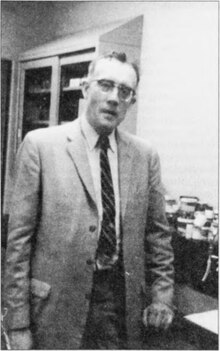Frank Siebert
Frank Siebert | |
|---|---|
 | |
| Born | Frank Thomas Siebert, Jr. April 2, 1912 Louisville, Kentucky, U.S. |
| Died | January 23, 1998 (aged 85) Bangor, Maine, U.S. |
| Burial place | West Laurel Hill Cemetery, Bala Cynwyd, Pennsylvania |
| Education | |
| Occupation | Pathologist |
| Spouse | Marion Paterson (m. 1956; div. 1964) |
| Children | 2 |
Frank Thomas Siebert Jr. (April 2, 1912 – January 23, 1998) was an American pathologist who became a leading authority on Algonquian languages, including Penobscot, for which he compiled a dictionary.[1][2][3][4]
Early life
Siebert was born in Louisville, Kentucky, on April 2, 1912, and spent the first five years of his life in Nashville, Tennessee. In 1917, his family moved first to Philadelphia and then to Merion Station, Pennsylvania, where he grew up.[1][3]
He attended Haverford College, studying chemistry and graduating in 1934.
Professional career
Siebert started as a medical pathologist before leaving medicine to focus on linguistics. He studied medicine at the medical school of the University of Pennsylvania graduating in 1938. Apart from his medical studies at Penn, he was influenced by anthropologist Frank Speck in his interest in Native American languages. Traveling to other universities, he was also influenced by Franz Boas and Edward Sapir.[1] In 1969, he became a Guggenheim fellow.[5]
In 1980, he received a grant from the National Endowment for the Humanities for the creation of a Penobscot dictionary, a project that he had been working on since at least 1968.[2][3]
Ives Goddard of the Smithsonian Institution called Siebert "clearly the most brilliant and most competent avocational linguist working on Native American languages that there has ever been, hands down."[2] Karl Teeter, commenting on Siebert, called him "the dean of Algonquian linguistics".[3]
Personal life
In 1956, he married Marion Paterson, with whom he had two daughters. The marriage broke down in 1961, and divorce followed in 1964.[1]
He was described as an eccentric and recluse. He collected rare books.[1]
Death
Siebert died in Bangor, Maine, on January 23, 1998, at the age of 85, after suffering for several years from cancer of the urinary tract and ensuing complications. He was buried with his mother and father at West Laurel Hill Cemetery in Bala Cynwyd, Pennsylvania.[1][6]
Following his death, his collection of books and antiquarian items was sold at Sotheby's for $12.5 million, which was split between his two daughters. His dictionary and field-work materials were bequeathed to the American Philosophical Society.[2]
References
- ^ a b c d e f Goddard, Ives (1998). "Frank T. Siebert, Jr. (1912–1998)". Anthropological Linguistics. 40 (3): 481–498. JSTOR 30028650.
- ^ a b c d Gregory, Alice (April 12, 2021). "How Did a Self-Taught Linguist Come to Own an Indigenous Language?". The New Yorker. Archived from the original on April 16, 2021.
- ^ a b c d McCorison, Marcus A. (1998). "Obituaries: Frank Thomas Siebert, Jr" (PDF). Proceedings of the American Antiquarian Society. 108: 299–304. Archived (PDF) from the original on September 10, 2015.
- ^ Singer, Richard B. (1998). "Frank Siebert: Then, And More Than "Forty Years On"". Maine History. 37 (3): 71–77. Archived from the original on August 6, 2020.
- ^ "Frank T. Siebert Jr". John Simon Guggenheim Memorial Foundation. Archived from the original on March 27, 2023.
- ^ "Obituaries and Funerals: Dr. Frank T. Siebert Jr". Bangor Daily News. January 24, 1998. Archived from the original on May 3, 2024.
